Mindfulness can greatly enhance your performance as a judge. It sharpens cognitive functions and helps you focus on facts while reducing biases. Practicing mindfulness fosters a composed demeanor, which is crucial for sound decision-making. It also encourages reflective practices and empathetic listening, promoting fairness in the courtroom. However, obstacles like time constraints and peer skepticism exist. Discover how mindfulness can transform your judicial experience and improve your decision-making process further.
Key Takeaways
- Mindfulness enhances judges’ cognitive functions, improving attention, memory, and decision-making processes in the courtroom.
- Regular mindfulness practices help reduce implicit biases, promoting more equitable and fact-based judicial decisions.
- Engaging in mindfulness training fosters nonjudgmental awareness, allowing judges to manage emotions and maintain impartiality during proceedings.
- Incorporating mindfulness into daily routines can improve focus, efficiency, and overall well-being in high-stress judicial environments.
- Mindfulness practices enhance public trust and perception of fairness in the judicial system, strengthening community respect for the judiciary.
Benefits of Mindfulness for Judges

As you navigate the complexities of judicial decision-making, practicing mindfulness can significantly enhance your cognitive functions. It sharpens your attention, improves memory, and boosts executive functioning, leading to more informed decisions.
You’ll find that mindfulness reduces implicit biases, allowing you to recognize and manage your thoughts and emotions better. This heightened awareness ensures your decisions are grounded in facts rather than assumptions.
Moreover, being fully present enables you to handle complex cases with greater efficiency, even if it takes a bit longer upfront. Ultimately, mindfulness not only improves your decision-making process but also contributes to your overall well-being, fostering a more stable and composed demeanor in court.
Being fully present enhances your efficiency in complex cases, promoting better decision-making and overall well-being in the courtroom.
Embrace mindfulness to elevate your judicial practice.
Mindfulness Practices for Judges
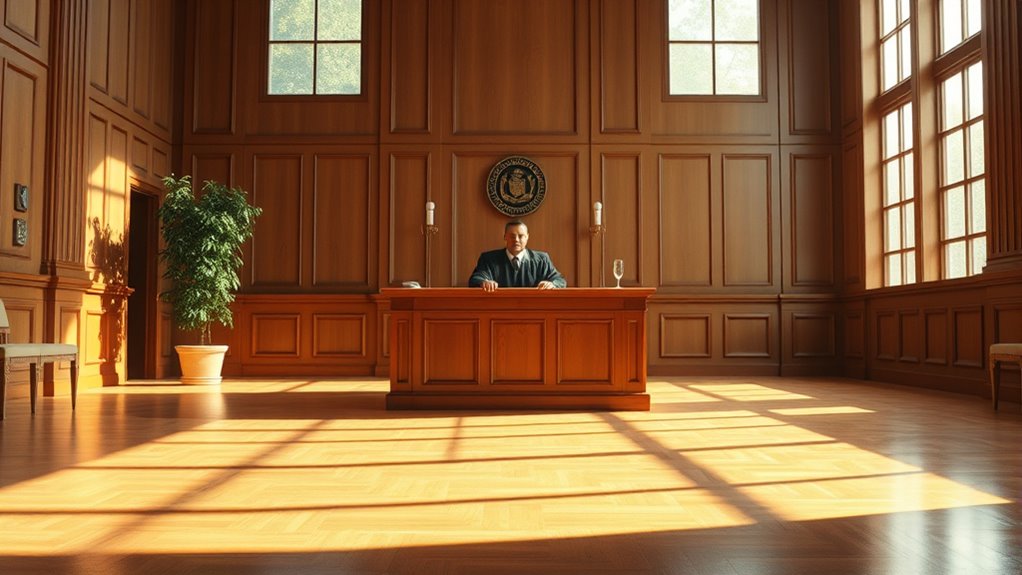
Practicing mindfulness can take various forms that directly enhance your role as a judge. You might begin by engaging in mindfulness training, like the eight-week courses developed since 1987, focusing on stress reduction and emotional well-being.
Before entering the courtroom, take a moment to ground yourself and enhance your focus. While in court, consider practicing mindful listening to fully engage with litigants, ensuring you understand their experiences.
You can also utilize short mindfulness exercises during recess to maintain calm and clarity. This practice can help you manage emotions, encouraging impartiality and enhancing your decision-making.
Impact on Judicial Decision-Making
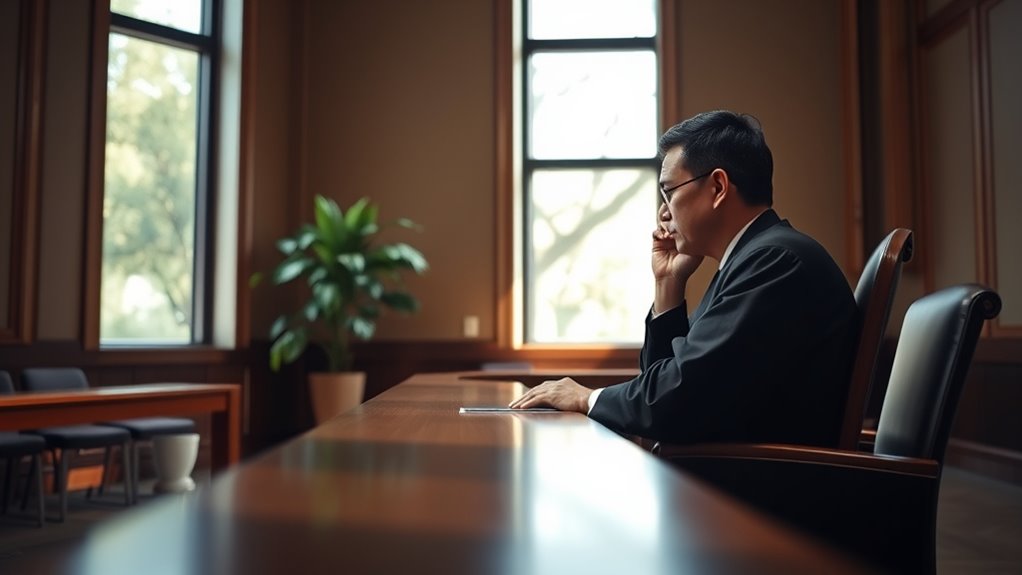
Mindfulness significantly impacts judicial decision-making by enhancing your awareness and reducing biases. By practicing mindfulness, you become more aware of your thoughts and emotions, allowing you to manage biases effectively.
This non-judgmental approach helps you focus on facts rather than personal opinions, promoting impartiality in your rulings. With reduced emotional reactivity, you can tackle cases with a clear, objective mindset.
Increased self-awareness enables you to identify and set aside personal biases, leading to fairer judgments. Additionally, mindfulness improves your focus and cognitive clarity, helping you evaluate evidence more thoroughly.
Ultimately, this reflective approach fosters more informed, just outcomes, enhancing public trust in the judicial system while supporting your well-being and job satisfaction.
Challenges and Limitations
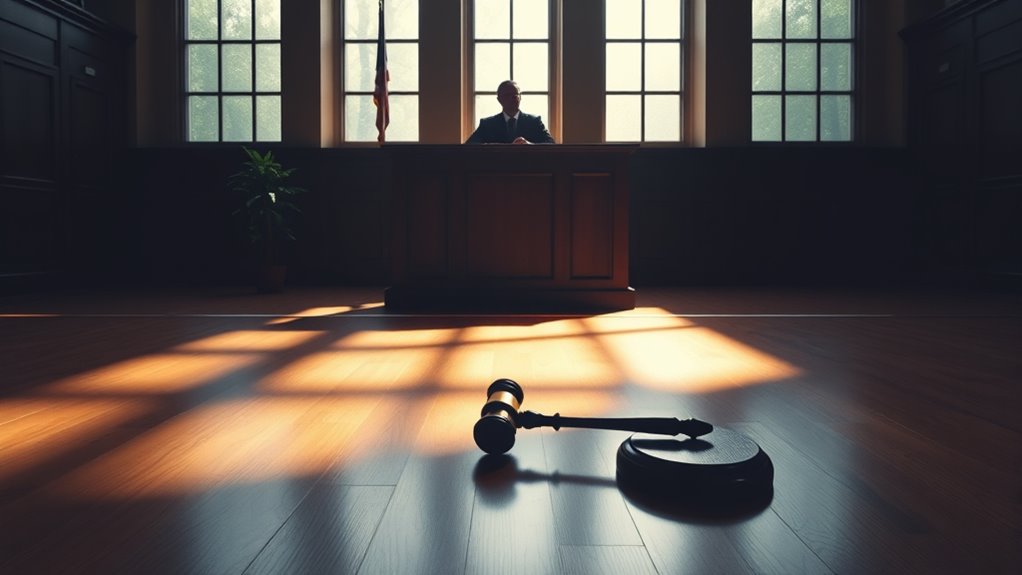
While the benefits of mindfulness are compelling, judges face numerous challenges and limitations in implementing these practices effectively.
Time constraints often hinder your ability to carve out moments for mindfulness amid heavy workloads. You might also encounter skepticism from peers who view mindfulness as incompatible with the judicial role.
Time constraints and peer skepticism can obstruct judges from embracing mindfulness in their demanding roles.
Physical discomfort can distract you, while the high-stakes environment makes maintaining focus tough. Cultural resistance may further complicate adoption.
Additionally, accessibility issues and funding constraints can limit training opportunities. Once you begin practicing, mind wandering and managing emotions might challenge your objectivity.
Without consistent support, sustaining mindfulness over time can feel daunting, leaving you to balance personal and professional gains amidst ongoing pressures.
Historical Context of Mindfulness in Judiciary
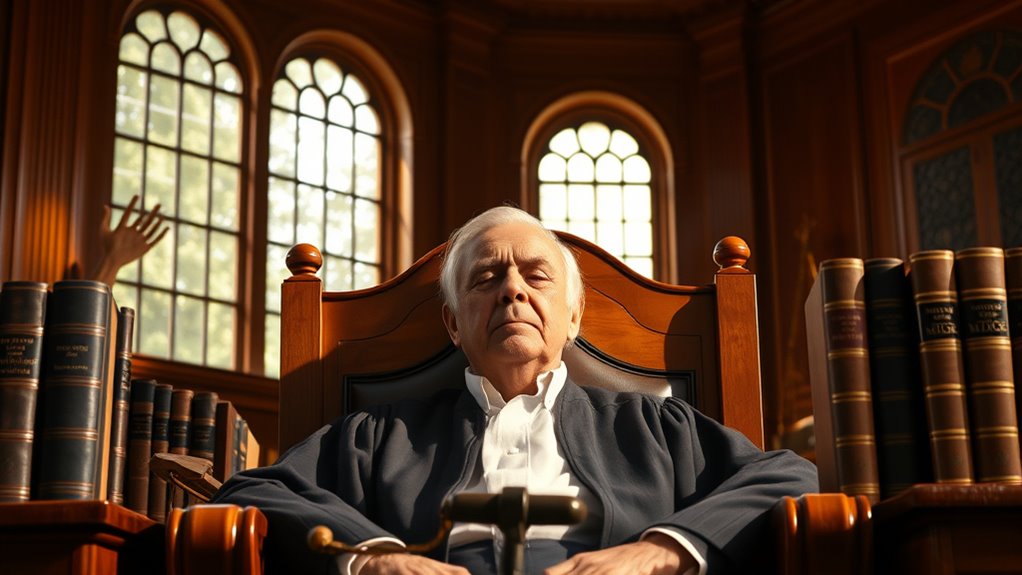
Since the late 1980s, mindfulness has gradually found its place within the judiciary, beginning with Judge Richard Connon‘s innovative inclusion of mindfulness instructions in a jury charge.
In the 1990s, Judge Ronald Greenberg highlighted meditation’s value for judges in the New York Times. By 2002, law professor Evan Seamone’s article “Judicial Mindfulness” further addressed its importance.
As early adopters embraced mindfulness to manage stress and improve performance, Judge Alan Gold began advocating for its benefits in 2011. The Eleventh Circuit Court of Appeals included mindfulness training in 2013, followed by Judge Carroll Kelly’s programming in Miami in 2015.
Today, the National Judicial College and Federal Judicial Center incorporate mindfulness into their training, reflecting its growing significance in judicial practice.
Future Directions and Research
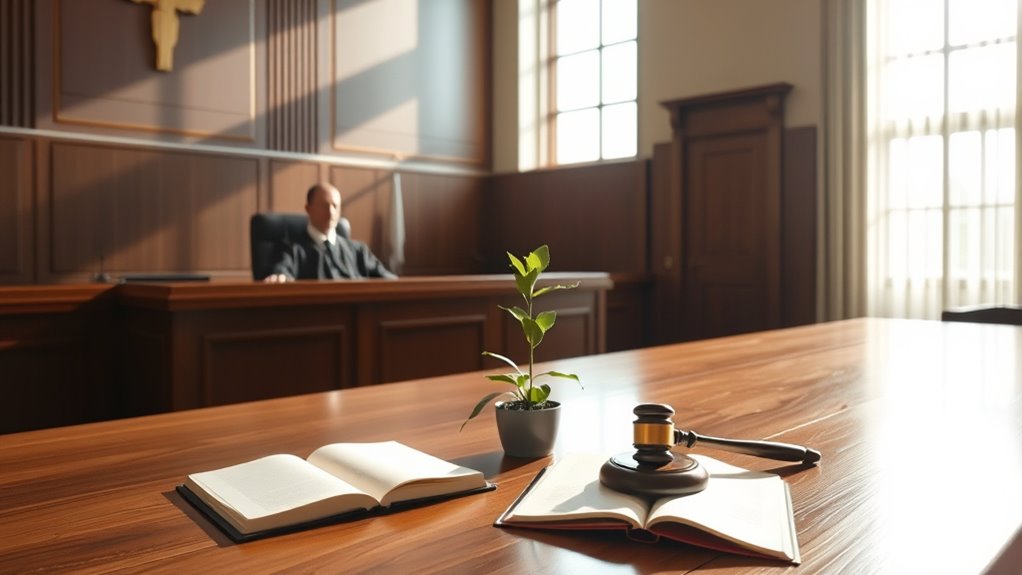
As the judiciary continues to evolve, exploring mindfulness practices presents an exciting opportunity for enhancing judicial effectiveness and well-being.
Future research should delve into various mindfulness techniques like MBSR and MBCT to see how they influence decision-making. Cross-cultural studies can reveal mindfulness’s impact across diverse legal systems.
Investigating the neurological changes in judges who practice mindfulness may uncover insights into better decision-making. Additionally, examining how mindfulness reduces implicit biases and studying its long-term benefits will be crucial.
We should analyze mindfulness’s role in improving decision-making efficiency, reducing stress, and fostering emotional regulation.
Developing tailored mindfulness programs and integrating them into judicial education could further bolster judges’ performance and public trust in the judiciary.
Enhanced Cognitive Function Through Mindfulness
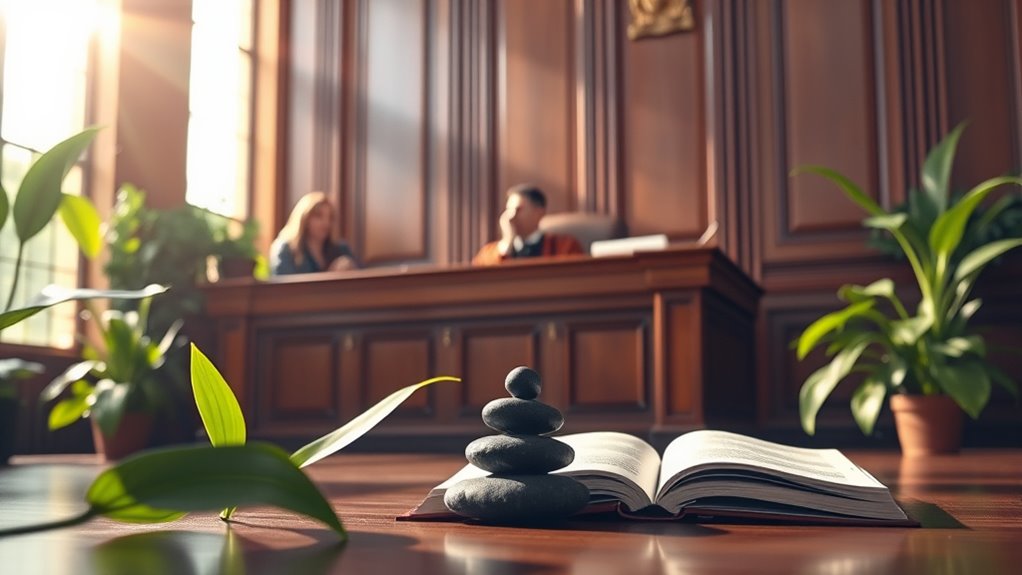
Mindfulness can significantly enhance cognitive function, making it a valuable tool for judges navigating complex legal decisions. By focusing on the present moment non-judgmentally, you can improve your attention and reduce mind wandering. This heightened focus is crucial in high-stakes environments where clear decision-making is essential.
Regular mindfulness practice not only boosts your working memory but also supports cognitive resilience, helping you maintain consistent performance even under pressure. Neuroscientific research shows that mindfulness can alter brain structures related to attention and emotional regulation, further enhancing your cognitive skills.
Embracing mindfulness fosters decision-making clarity and reflective thinking, enabling you to navigate challenges more effectively while managing stress and emotional responses.
Reducing Stress and Burnout in the Judiciary
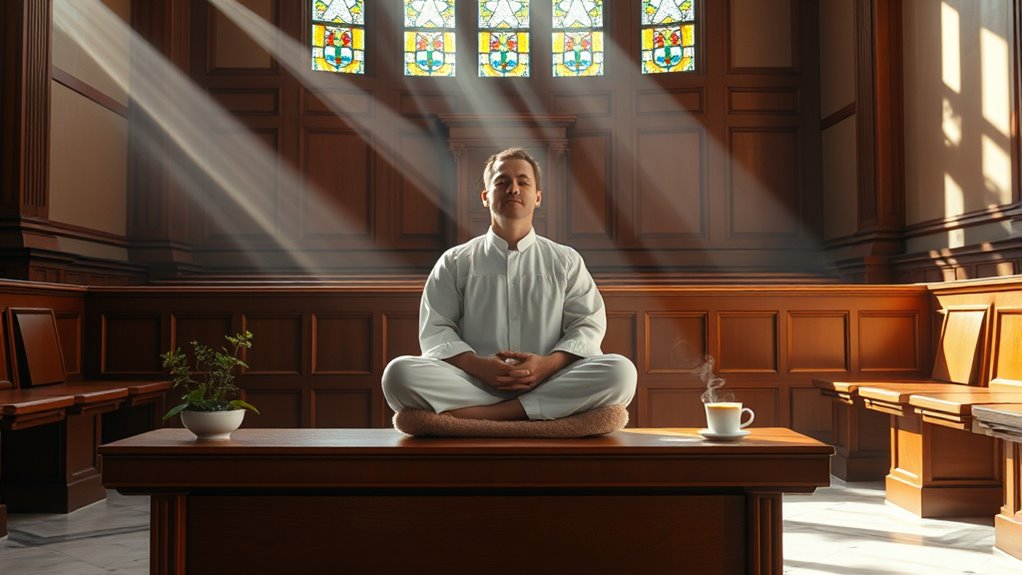
Judges face significant stressors that can lead to burnout and impact their ability to perform effectively. With about one-third reporting fatigue and low energy, the workload, safety concerns, and interpersonal conflicts weigh heavily. This stress can disrupt mental health, with one in five judges meeting criteria for depressive disorders. The pressure of handling traumatic cases adds to the burden, making stress management essential. Social isolation further exacerbates feelings of burnout, diminishing job satisfaction. Implementing mindfulness techniques can provide a practical approach to reducing stress, enhancing emotional well-being, and improving focus. Seeking support from friends and family can also play a crucial role in mitigating the effects of stress and fostering resilience.
Mindfulness and Impartiality in Judicial Proceedings
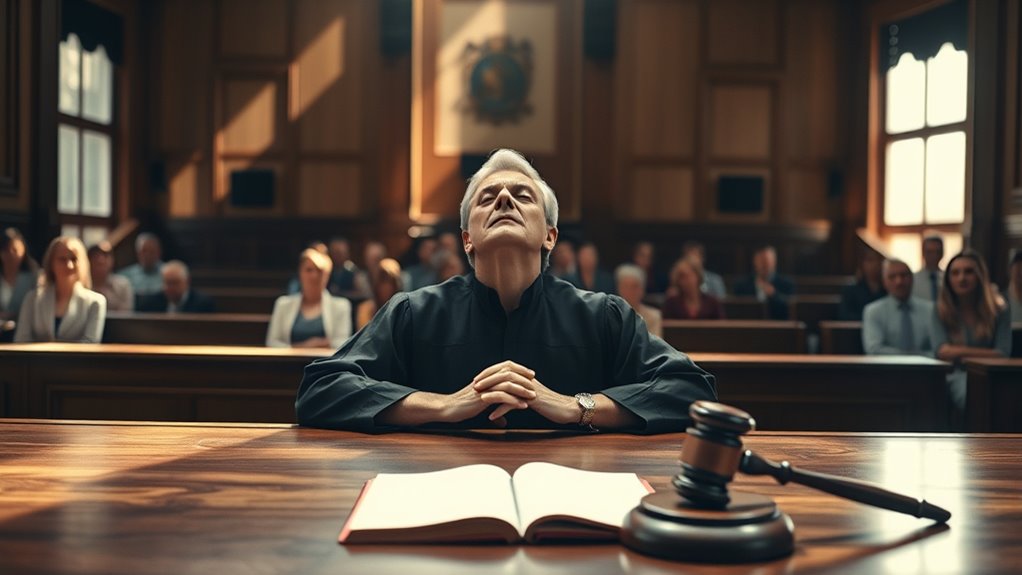
While navigating the complexities of judicial proceedings, maintaining impartiality is crucial for ensuring fair outcomes.
Mindfulness helps you cultivate a nonjudgmental awareness of your thoughts and emotions, allowing you to remain focused on case details without distractions. By reducing stress, mindfulness mitigates implicit biases, leading to more equitable decisions.
Mindfulness fosters nonjudgmental awareness, enhancing focus and reducing biases for equitable judicial decisions.
It encourages reflective decision-making, enhancing your critical thinking skills and helping you avoid unchecked assumptions. When you practice mindfulness, you also foster compassion, promoting respect and dignity in the courtroom.
This approach not only improves your cognitive functions but also enhances public perception of fairness. Incorporating mindfulness into your routine can ultimately lead to better outcomes for all parties involved in the judicial process.
Frequently Asked Questions
How Can Judges Find Time for Mindfulness Practices?
You can find time for mindfulness practices by prioritizing short sessions in your daily routine.
Schedule breaks throughout your day to practice simple exercises, even if it’s just for a few minutes.
You might also consider integrating mindfulness into existing activities, like your commute or lunch.
With the support of colleagues, you can create a culture that values mindfulness, making it easier to maintain these practices amid your busy schedule.
Are There Any Specific Mindfulness Apps Recommended for Judges?
You won’t believe how easy it can be to find peace in a chaotic world!
If you’re curious about mindfulness apps, you’ve got some fantastic options. Try Calm for guided meditations, or Headspace if you’re short on time.
Insight Timer offers a treasure trove of free content, while the Healthy Minds Program combines neuroscience with meditation.
Ten Percent Happier focuses on practical techniques that fit high-pressure situations. Dive in and discover what suits you best!
What Are the Costs Associated With Mindfulness Training for Judges?
When considering mindfulness training, you’ll find various costs involved. For example, tuition fees might range around $1,979, and additional conference fees can add about $549.
Typically, these programs last several days, providing intensive training. While scholarships may not always be available for every course, some related programs could offer financial assistance.
Can Mindfulness Be Practiced During Court Sessions?
Yes, you can practice mindfulness during court sessions. Incorporating brief mindfulness exercises, like focused breathing or visualization, can help you reset your focus and maintain calmness.
Even a few moments of awareness can enhance your engagement with the proceedings. Additionally, you might find that integrating mindfulness into your routine allows for better decision-making and stress management, ultimately benefiting the overall courtroom environment and ensuring a fairer process for everyone involved.
How Can Judges Measure Their Mindfulness Progress?
Measuring your mindfulness progress is like charting a ship’s course through foggy waters.
You can start by reflecting on your ability to manage stress and maintain impartiality. Consider keeping a journal to document your thoughts and feelings, as well as feedback from colleagues and those you serve.
Engaging in mindfulness workshops can also provide valuable insights. Regular self-assessment will illuminate your growth, helping you navigate the path toward greater awareness and clarity.
Conclusion
Incorporating mindfulness into the judiciary isn’t just a passing trend; it’s a game changer. By embracing these practices, you can enhance your cognitive function, reduce stress, and promote impartiality in your decisions. As you navigate the complexities of the legal system, remember that taking a moment to breathe can go a long way. So, don’t let the weight of the world rest on your shoulders—make mindfulness a cornerstone of your judicial approach for a more balanced perspective.










